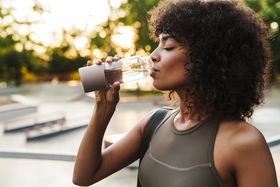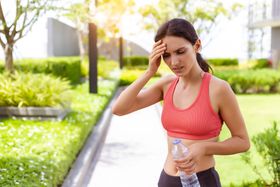Hydration and Hypertension: Can Drinking Water Lower Your Blood Pressure?
A detailed exploration of the relationship between hydration and hypertension. We examine scientific evidence on whether drinking water can effectively lower blood pressure.
Updated February 5, 2025

When I was in high school, my grandmother started getting tired and dizzy during lunch. At first, she neglected this feeling because of her busy life, but something was not right. Water intake was always her Achilles heel. She said she didn't like the taste of guzzling coffee and sodas every day.
On one of her regular health checkups, the doctor diagnosed her with high blood pressure. The cause? Persistent dehydration.
We were all surprised by it, but it was right on our faces the whole time. When she started hydrating regularly, her blood pressure stabilized. This anecdote just shows how even the slightest change can impact your health.
That's why I always remind my patients they should stay hydrated, and you should, too.
» Prevent dehydration and hypertension by using electrolyte drops
Signs and Symptoms of Dehydration
Mild to Moderate Dehydration
- Thirst
- Dry mouth, lips, and tongue
- Less frequent urination
- Dark-colored urine
- Fatigue
- Headache
- Muscle cramps
- Dizziness or lightheadedness
Severe Dehydration
- Extreme thirst
- No urination or very dark urine
- Sunken eyes
- Dry, cool skin
- Rapid heartbeat
- Rapid breathing
- Confusion or irritability
- Fainting
» Find out how to check if you're dehydrated
Is Water Good for High Blood Pressure?
Dehydration increases blood thickness, making it harder for the heart to pump blood. The result is hypertension, leading to a higher heart rate as the body struggles to maintain adequate circulation. It also disrupts the body's electrolyte-water balance, increasing the risk of cardiovascular disease.
Researchers have been exploring the impact of dehydration on hypertension for quite some time now. A systematic review (more reliable than individual studies) looked into the effects of dehydration on heart rate, heart rate variability, and high blood pressure during and after exercise. [1]
Additionally, water helps maintain the balance of electrolytes, including sodium. When adequately hydrated, the body can more effectively flush it through urine. But why is this important? High levels of this mineral cause the body to retain water, increasing blood volume and pressure.
» Check out the healthiest types of water to drink
The Most Effective Water Type for Dehydration
Alkaline water has calcium, magnesium, and potassium, which are essential minerals beneficial for heart health. These minerals widen your blood vessels and improve overall cardiovascular function.
Here's how:
- Calcium interacts with hormones that regulate high blood pressure, such as parathyroid hormone (PTH) and calcitonin. [2]
- Potassium balances sodium levels in the body. It helps you release it through urine, lowering blood volume and pressure.
- Magnesium helps relax blood vessels and prevent constriction, which increases blood pressure. It also balances electrolytes, supporting overall heart health.
A systematic review of meta-analyses analyzed the effects of sodium, potassium, calcium, and magnesium on high blood pressure. [3] It found that increasing potassium intake can effectively reduce it. Higher potassium also decreases sodium, reducing the risk of hypertension.
At the same time, magnesium and calcium supplementation also lowered participants' blood pressure. Overall, the findings suggest that dietary electrolytes are crucial in managing and preventing hypertension.
Sometimes, an electrolyte intake through the diet may not be enough. Electrolyte drops can provide a convenient and effective way to replenish them, especially during intense physical activity.
Electrolytes play a crucial role in fluid balance. By providing essential minerals, electrolyte drops can enhance the body's ability to absorb and retain water, promoting hydration.
» Check out the best sugar-free electrolyte drops for active hydration
Optimal Water Intake Guidelines
Here are the guidelines for optimal water intake in the US according to the National Institute of Sciences [4]:
- Adult Women: 11 cups or 91 ounces/day
- Adult Men: 15.5 cups or 125 ounces/day
You should drink more water during physical activity to compensate for fluid loss through sweat. Aim for an additional 1–2 cups/hour of moderate activity.
Finally, drink more water to prevent dehydration in hot weather, which can strain the cardiovascular system. Aim for an extra 2–4 cups daily, in addition to the general guidelines we mentioned above.
» Explain the benefits and risks of hot and cold water
How Quickly Does Drinking Water Lower Blood Pressure?
Blood pressure can start to improve within 15–30 minutes after rehydration. But, significant changes may take a few hours, depending on the severity of dehydration and individual health factors.
Each person's physiological response varies due to age, overall health, and existing medical conditions. Younger, healthier individuals may see improvements quicker than older or those with chronic illnesses.
Mild dehydration may see rapid improvement within an hour, while severe dehydration requires more prolonged and substantial fluid intake for major blood pressure reduction.
Note: Maintaining consistent hydration throughout the day is more effective than drinking large amounts of water sporadically. Regular water intake helps keep high blood pressure stable and supports overall cardiovascular health.
» Are you a parent? Learn hacks to keep your toddler hydrated
Foods and Beverages to Prioritize and Avoid
Foods to prioritize:
- Leafy Greens: Spinach, kale, and Swiss chard are rich in potassium, which helps balance sodium levels and reduce high blood pressure.
- Berries: Blueberries are high in flavonoids, which have been shown to lower blood pressure and improve arterial health. [5] Their antioxidants also help reduce inflammation and oxidative stress.
- Low-Fat Dairy: Milk, yogurt, and cheese provide calcium and vitamin D, both of which are crucial for maintaining healthy blood pressure levels. Calcium helps blood vessels tighten and relax properly, while vitamin D supports overall cardiovascular health. [6]
Foods and beverages to avoid:
- Processed Foods: Packaged snacks, canned soups, and fast foods are often high in sodium, leading to fluid retention and increased blood pressure.
- Sugary Beverages: Sodas and sweetened drinks add to weight gain and high blood pressure. High sugar intake can also cause insulin resistance, which relates to hypertension and cardiovascular diseases.
- Alcohol: Excessive alcohol can damage the heart and blood vessels. Limiting intake to moderate levels—up to one drink per day for women and two for men—can help maintain healthy blood pressure.
» Check out the benefits of mineral water for arthritis
Hydrate Your Way to Lower Blood Pressure
The evidence suggests that staying hydrated can indeed help manage hypertension. While drinking water alone may not be a cure-all, it's a crucial component of a healthy lifestyle.
You can help maintain optimal blood pressure levels and support your overall cardiovascular health by prioritizing adequate water intake. Remember to consult with a healthcare professional for personalized advice and to address any underlying health conditions.
» Manage your high blood pressure. Boost hydration with essential minerals
References:
- A. A. Porto et al., “Influence of Fluid Ingestion on Heart Rate, Cardiac Autonomic Modulation and Blood Pressure in Response to Physical Exercise: A Systematic Review with Meta-Analysis and Meta-Regression,” Nutrients, vol. 15, no. 21, p. 4534, Oct. 2023, doi: 10.3390/nu15214534. Available: https://www.mdpi.com/2072-6643/15/21/4534
- E. Yu and S. Sharma, “Physiology, calcium,” StatPearls - NCBI Bookshelf, Aug. 14, 2023. Available: https://www.ncbi.nlm.nih.gov/books/NBK482128/
- S. Iqbal, N. Klammer, and C. Ekmekcioglu, “The effect of electrolytes on blood pressure: A Brief summary of Meta-Analyses,” Nutrients, vol. 11, no. 6, p. 1362, Jun. 2019, doi: 10.3390/nu11061362. Available: https://www.ncbi.nlm.nih.gov/pmc/articles/PMC6627949/
- I. O. Medicine, Dietary reference intakes for water, potassium, sodium, chloride, and sulfate. 2005. doi: 10.17226/10925. Available: https://nap.nationalacademies.org/catalog/10925/dietary-reference-intakes-for-water-potassium-sodium-chloride-and-sulfate
- W. Kalt et al., “Recent research on the health benefits of blueberries and their anthocyanins,” Advances in Nutrition, vol. 11, no. 2, pp. 224–236, Mar. 2020, doi: 10.1093/advances/nmz065. Available: https://www.ncbi.nlm.nih.gov/pmc/articles/PMC7442370/
- “Office of Dietary Supplements - calcium.” Available: https://ods.od.nih.gov/factsheets/Calcium-HealthProfessional/
FAQs
Can too much water cause high blood pressure?
No. While severe dehydration can lead to low blood pressure, excessive water intake generally doesn't cause high blood pressure. However, individuals with certain medical conditions might need to monitor their fluid intake.
Is blood pressure higher right after drinking water?
No. Drinking water generally doesn't immediately raise blood pressure. In fact, for people with severe dehydration, it can temporarily lower blood pressure.
What should I do first thing in the morning to lower blood pressure?
- Start your day with a glass of water to help regulate blood volume.
- Practice deep breathing exercises to reduce stress.
- Begin your day with light exercises like yoga or stretching.
- Opt for a nutritious breakfast rich in fiber and lean protein.
- Consider meditation or journaling to manage stress.
What can cause blood pressure to rise suddenly?
- Stimulants like caffeine and nicotine can narrow blood vessels, increasing blood pressure.
- Some medications, including NSAIDs, decongestants, and birth control pills, can raise blood pressure.
- Conditions like kidney disease, thyroid disorders, and sleep apnea can contribute to sudden blood pressure spikes.
- A rare tumor of the adrenal gland can cause sudden, severe blood pressure spikes.
Should I lie down if my blood pressure is high?
Yes, lying down can temporarily lower your blood pressure. It can be helpful if you're feeling lightheaded or dizzy due to high blood pressure. However, if your blood pressure remains elevated or you experience other symptoms like chest pain or difficulty breathing, seek medical attention immediately.
Disclaimer: The information published by MAYU Water is not a substitute for the expert knowledge, advice, and recommendations of trained professionals. We strongly recommend consulting with industry experts and primary or scientific sources before making any health, research-related, or other important decisions.













































